Iran’s Ambassador to Ireland Masoud Eslami has said that US sanctions on Iran have affected the Islamic Republic in a similar way to the Irish famine due to similarities in foreign intervention
Jubilant crowds sang and danced on Iran's streets in 2015 as they marked a defining moment in the country's history.
They beeped horns and whooped from moving cars showcasing behaviour not usually accepted in the Islamic Republic.
It was a moment of national unity with the country celebrating Iran signing a deal to curb its nuclear programme after years of international isolation and economic problems.
A diplomatic marathon resulted in the Joint Comprehensive Plan of Action, or JCPOA, which was signed by Iran and China, France, Germany, Russia, the United Kingdom and the United States to limit Iran's nuclear activity in return for easing economic sanctions against Iran.
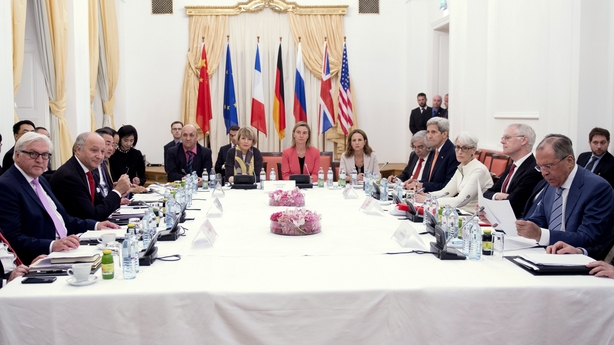
In 2006, an international sanctions regime was imposed on the country following concerns of their nuclear programme.
"Today is an end and a beginning," President Hassan Rouhani declared to the nation on national television.
And that's what happened. Iran enjoyed a moment of optimism after the sanctions were lifted, fuelled by financial growth and foreign investment.
It only took four years, a new US President and a continued culture of corruption, for it all to come crumbling down.
On the campaign trial for office, Donald Trump pledged to pull out of the deal with Iran and he stuck by his word.
Calling it "one-sided" and "horrible", in May 2018 President Trump withdrew from the accord and slapped Iran with new sanctions.
The US commander-in-chief said the JCPOA did not do enough to curb Iran's ballistic missiles programme or address its support for armed groups in the Middle East.
The purchase and acquisition of US dollar bank notes, trade of gold and metals, the sale to Iran of cars, imports of carpets and caviar, and the sale to Iran of commercial passenger aircrafts were all restricted.
Months later, the oil and energy sector were also sanctioned, along with shipping and financial institutions conducting transactions with the Central Bank of Iran.
Some international companies pulled out of Iran out of fear of retaliation from the United States.
Not only was the relationship between Iran and the United States plunged into despair, so did the Iranian economy.
Oil exports fell from 2.8m barrels a day in May 2018 to 1.3m this year. It's also likely to fall further.
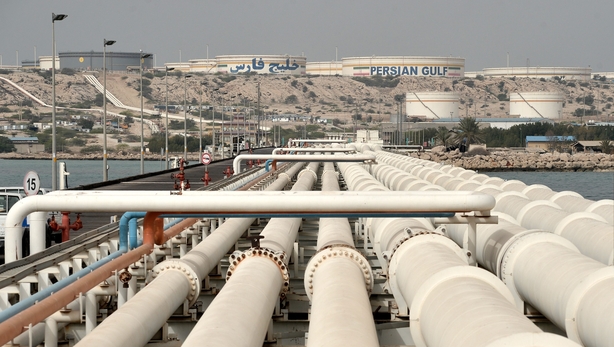
The International Monetary Fund said Iran's inflation could reach 40% this year as the country continues to cope with the sanctions.
According to the IMF and its estimates, Iran's economy shrank by 3.9% last year and is expected to further shrink by 6% this year.
US officials say that the sanctions have denied the Iranian government over $10bn in oil revenue.
"These sanctions have affected Iran in a very similar way that the Irish people have been affected by the famine which was imposed by foreign intervention," Iran’s Ambassador to Ireland Masoud Eslami said.
Those on the ground were clearly not happy with the developments.
In 2017, the nation was back on the streets with a different message compared to the one two years previously.
Protests swept across Iran and continued into 2018, with many frustrated by the government's economic policies.
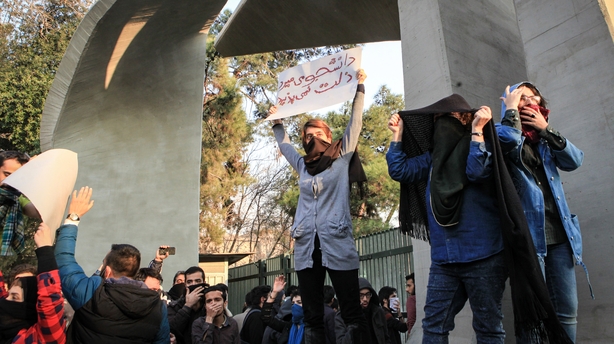
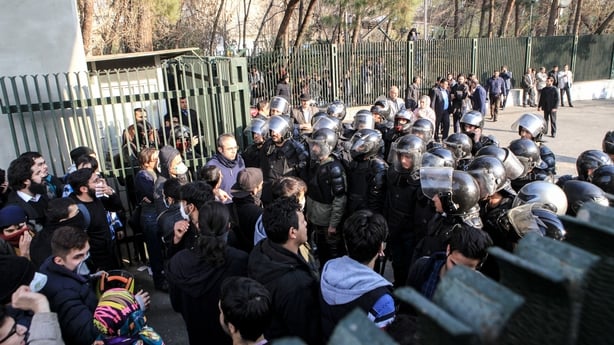
However, Middle East expert Azadeh Moaveni said Iran has been challenged for years and years and didn't have a strong economy to start with.
"It was an economy that never really blossomed because of Iran's political isolation and a big motivation of Iran's agreement to the nuclear deal was the perceived economic benefit that would flow from it," she said.
Ms Moaveni said Iran is a country that had labour protests about unpaid salaries, but things have got progressively worse with the US sanctions.
We need your consent to load this rte-player contentWe use rte-player to manage extra content that can set cookies on your device and collect data about your activity. Please review their details and accept them to load the content.Manage Preferences
One Iranian living in Ireland said the mix of US sanctions and government actions have had an strong effect on the country.
Farhad, not his real name as he wished to remain anonymous, said that Iranians are not dying of hunger, but "hardship doesn't have to be hunger".
"[There's been a] general shift to lower quality of life and lower economic capability. But of course, probably the lower and middle class has been most affected by that," he said.
Farhad said prices have tripled since the sanctions, but wages have stayed the same, which has left people frustrated.
"I got this mocha for €4. In four months’ time, I come and pay for the same thing and it's says €12. So how would you feel?" he said.
A lot of families, he said, have had to scale back on some more expensive types of food, such as meat.
He said when he is visiting Iran he's noticed more beggars on the streets and the number of homeless have increased.
Farhad said he feels the international community have started to isolate Iran again.
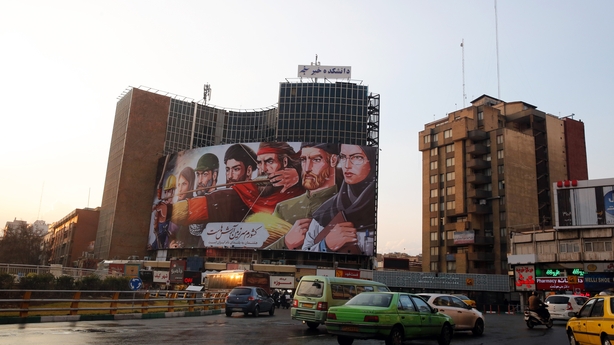
"Even those Iranians living abroad have problems in research projects. Some universities told Iranian employees you are not allowed to give scientific presentations when you go to Iran and you are not even allowed to have a Skype conversation ... with anyone in Iran", he said.
It's also more difficult to go home with flights limited to Iran from international hubs and the price has also doubled, which means they can't visit as much, according to Farhad.
He said that it's not all on the US sanctions and the government "could do a better job".
"Some sectors are suffering from corruption, poor practices, lack of organisation," he said, but acknowledged that similar practices happened in Greece and Italy.
"No matter how good the government is, there are some deep rooted issues that can't be addressed," he said.
According to Transparency International, Iran rates 138 out of 180 on their Corruption Perceptions Index.
However, he acknowledged that if the sanctions were lifted, it would dramatically improve things and people's lives in Iran.
For now, people feel "sad and sorry" back home, he said.
That sadness and frustration on the ground was heard by the Iranian government and a year after the Trump administration pulled out of the deal, Iran decided it had enough.
Mr Rouhani in May gave the remaining signatories an ultimatum, protect us from US sanctions or we will breach the deal.
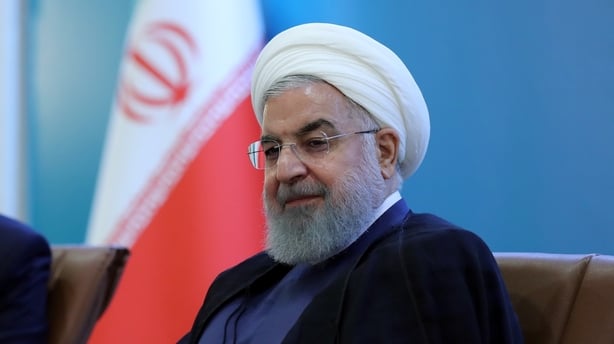
Two months later, time was up with no agreement and the Islamic Republic announced that it was breaching the nuclear pact.
Under the pact, Iran is allowed to produce low-enriched uranium at 3.67% and is not allowed stockpile no more than 300kg.
For research reactors, they would need around 20%, as much as 90% for weapons.
At the beginning of July, Iran breached that stockpile limit and now it is on course to make low-enriched uranium up to 5%, for what it says is to "fuel a power plant".
It's a long cry from creating nuclear weapons, but Iran said it would keep reducing its commitments every 60 days unless they were protected from US sanctions.
Iran has also been desperate to get the attention of world powers by pushing their buttons.
The United States is blaming Iran for attacks on some oil tankers in the Persian Gulf this summer.
The US also announced efforts to create a military coalition to, what they say is, safeguard the waters around Iran and Yemen.
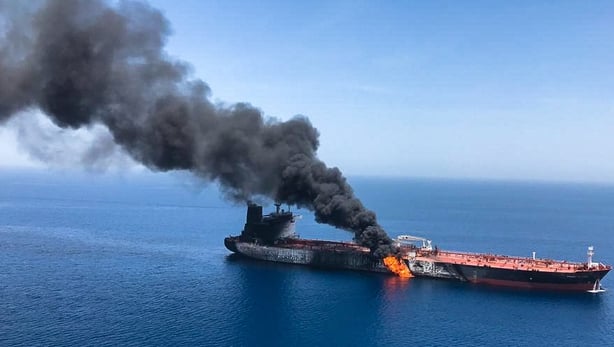
Their relationship with the United Kingdom is also strained after Britain seized an Iranian tanker off Gibraltar, which was allegedly carrying oil to Syria in breach of sanctions.
Iran appears to have made good on its threat to retaliate by attempting to halt a British oil tanker near a crucial waterway for international trade, the Strait of Hormuz.
It leaves Europe in a precarious position, stuck between a rock and a hard place - Tehran and Washington.
The Iranian Ambassador to Ireland called on the Irish Government to intervene in the diplomatic row.
Speaking to RTÉ News, Ambassador Masoud Eslami said that Ireland has the reputation and neutrality to "initiate diplomatic initiatives" to help deescalate tension in the region.
He also indicated that this could boost Ireland's position in bidding for a United Nations Security Council seat.
As the Iranian ambassador thinks Ireland can put pressure on others in Europe, he said he believes the nuclear deal is not dead with the country willing to go back to the negotiation table.
Ms Moaveni said the UK and France are trying to "cool things down" as Europe stated the latest breaches of the 2015 nuclear were "not significant" - clearly desperate to save the deal.
One of those who brokered the deal, the EU's foreign policy chief, Federica Mogherini, invited Iran to reverse the steps and go back to full compliance.
While the chances of the US going to war with Iran is low, the House of Representatives passed an amendment that would restrict President Donald Trump's ability to attack the Middle Eastern country without congressional authorisation.
For now, the door is still open for diplomacy. Who knows though for how much longer and what happens when Iran's next 60-day deadline is up.







